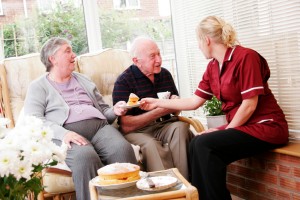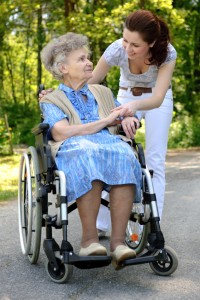The need for senior care has had an impact on many families, and the repercussions of care have extended into the workplace. Some people are finding that it is harder and harder to balance work and family as their parents age. Others decide that it is better to leave their jobs and focus exclusively on caring for the needs of their parent. While each family is different and what’s best for one isn’t always going to be best for another, overall, studies have shown that it is more expensive to leave a job to provide care as a family caregiver than it is to pay for a professional to provide care.
Besides having a financial toll on a family, this also hurts businesses. In the last five years, there has been a push by companies to try and offset this loss of labor with different policies and benefits to help their employees cope with the challenges that providing senior care can create.
One company that has recently recognized that accounting for senior care can help both employees and the company as a whole is Starbucks. A new policy initiated by Starbucks involves covering most of the cost of a replacement caregiver if the regular caregiver is unavailable to help on a given day. According to one source, the end cost for the Starbucks employee will be $1 per hour. The rest is supplemented by the company.

Starbucks is one of many companies that is recognizing the value of providing senior care benefits to employees.
This new program of Starbucks’ might not seem like a very helpful one–unless you have ever experienced the need for a sudden respite caregiver. If you’ have a routine that involves going to work while a caregiver watches your mom or dad, think about what would happen if your regular caregiver called you and said that they wouldn’t be in to help today. Most likely, you would need to stay home from work in order to provide care yourself. Starbucks is hoping to avoid this. The policy is intended to help families, but it is also geared toward helping to retain employees and reduce turnover within the company.
Starbucks is not the only company that is providing these types of benefits to employees. They are just one in a long line of businesses that have recognized the importance of helping employees out with family needs. Apple and Home Depot also have recently announced programs designed to help meet senior care needs.
Finding a care solution that works for you and your family is important. If the company that you work for does not offer senior care benefits, then perhaps a conversation with your HR department can get the ball rolling here.
In other instances, you might find that your company just can’t help you with the needs that your family has. If this is the case, there are other resources out there that can help you. Get in touch with your county’s Department of Social Services department to see what’s available near you, and feel free to give us a call to see how we can help your family on our end.
The post Starbucks Leading the Way in Senior Care Benefits appeared first on Paradise In-Home Care.



